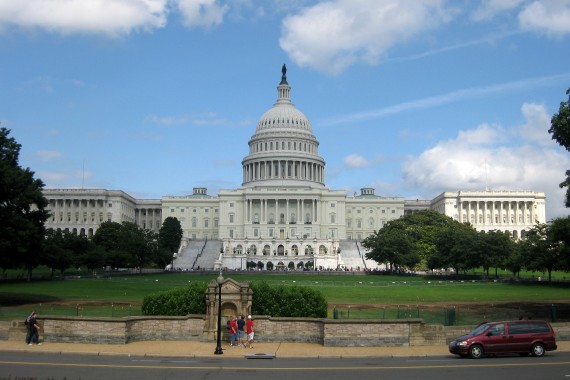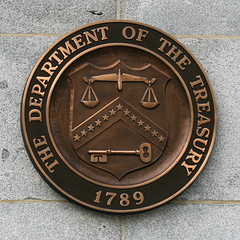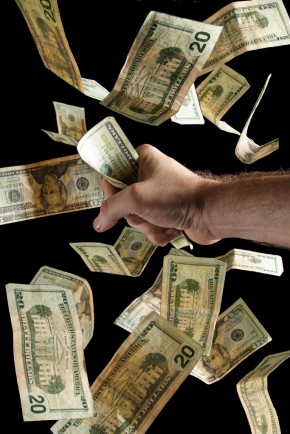My guest writer today on the Rickety blog is my uncle Paul. Your comments are welcome.
A Productive Economy
Money for services and service jobs arises out of a productive economy — not vice versa. Moreover, service jobs are useful to the economy only if the service furnishes increased value to the products we make to sell in our markets and foreign markets. That truism leads to the distinction between government and private services.
More Government Than We Need
We need to purchase some government service. The difficulty is we purchase more government services than we need because of political power rather than market demand. Our private economy is self-regulating when the producers and their labor must compete in a free market. Government service jobs do not. If a company cannot manufacture a competitive product it will not survive economically. Government service jobs are creatures of political power, therefore are regulated by political force. The role of government in this instance is to keep the market honest.
Contrary to popular assertions by politicians, free market forces did not cause the monetary breakdown we are experiencing. Introducing government into the market always distorts market value by addling costs. It was distortion of the market through congressional action that set the scene for failure. If left to its own devices, the market would drive out inefficient money houses. Moreover, government bailouts created larger monopolies on the premise that money entities are “…really are too big to (let) fail.” Government further degrades the market by choosing who receives the bailout monies. Monopolies are anti market and detrimental to free trade. For example:
Out of necessity to build lending capital, a normal market will pay higher interest to attract capital and replenish their funds. Because banking is a percentage game, banks live on revenue from a percentage of the money it lends. The bailout does just the opposite by propping up inefficient markets in an attempt to shore up prices and continue bloated valuation. Self-serving politicians rationalize their poor decisions by declaring the entities are “too big to fail.”
Keep Government Out of the Market
Keeping government out of the market allows housing and other goods to seek their value furnishing prices that are cheaper for average citizens. Investors collect more interest from the increased sales that fills government tax coffers and furnishes investment capital facilitating new business. Furthermore, by its action, government loses money from the treasury exacerbating the predicament because taxes collected from artificially imposed low interest rates to savers maintains unsustainable prices and moves the day of reckoning farther into the future. It is worth repeating that purchases of expanded services arise out of healthy income from production and not vice versa. We cannot exist as a great nation on a service economy. The production of goods makes the national worth greater by adding value through work thereby creating greater money reserves that fund new economic activity.
Work
Note that the operative word is work. The notion that a nation or anyone else can create wealth by spending money we don’t have is baseless and will result in a catastrophic occurrence of the economy. If deficit spending were the antidote we all ought to go out and get many more credit cards. There is no easy way or quick fixes. We must allow a resettling of the economy to sustainable levels that reflect worth before we can recover. And we must go back to work. Bear in mind the words of politicians who admit they don’t have a clue about what they are doing or what the results may be. They, out of ignorance, say all they know to do is borrow big and spend! Spend!
Make Work Jobs
Because government by definition does not produce new products for sale in foreign markets and our own, government diminishes wealth through taxation that could have been used by entrepreneurs for new investment in production. Moreover, government collecting taxes to employ people in “make work jobs” simply takes money from the investment pool and transfers funds to the non-productive parts of our service economy.
An argument may legitimately be made that a service such as building a new highway to facilitate movement of commerce is a vehicle-service that adds value to the local product. In general, commerce that idly sits in traffic costs us money and wastes our resources. However, if concocting an artificially imposed “good” — as perceived by a few with political power — wastes capacity, then we are purchasing too much service not regulated by market forces. In this case we are purchasing services by political fiat and are inefficient and wasteful. Jon Entine has said:
Political pressure to be “socially responsible” distorts the market decisions of government-related enterprises, leading to risky investments. (Reason Online Feb. 2009 The Next Catastrophe)
Deflation and Conventional Wisdom
Conventional wisdom declares deflation to be wrong for the country. In my view, that depends upon which social class it involves; money classes such as investors, bankers, “rich people” — you get the idea; or poor and middle class people. Deflation is deleterious for the money people who imprudently made bad investments but it is good for the poor and middle class. Here is why:
Deflation forces lower costs to manufacture goods in the U.S. allowing more jobs to be created. Housing costs are less, allowing more people to become homeowners. Deflation makes our products cheaper to make and more home produced products can be sold in our markets and world markets. Deflation makes foreign products more expensive to import into our markets. Market forces will cause manufacturers to come home provided we remove tax incentives that encourage manufacturing off shore.
Destruction of Our Collective Mettle
Failure makes one stronger. Trying over and over until one succeeds both educates and hardens the striver. Forcing us to work out our own enigma causes us to devise fresh ideas and new inventions for survival that makes real jobs that last into the future. Waiting for someone else or the government to do it for you keeps you weak and dependent — and disappointed. Most of the stimulus package works against the poor and middle class. Here is why: stimulus promoters pronounce, “Financial institutions are too big to let fail,” and created larger monopolies, the package props up the real estate market warping the true worth of property, the package prevents deflation (normal market correction), supports public employee unions that inflate prices for public service through political pressure, and promotes further public employee union organizing, faux stimulus diminishes capital formation through artificially low interest rates.
Waiting for Government
Currently, commerce is stagnant while everyone puts off the inevitable. They wait to see if the government will continue false valuation of an unsustainable economic plight. Meanwhile producers are taking advantage by culling excess labor and non-performing assets conjunctive to restructuring their tax position. Here is an example from the Tacoma News Tribune:
Much of the quarterly loss comes as Weyerhaeuser wrote down the value of its mills, land and products to reflect their current value.
Full Employment Economy Creates Wealth
Many argue about which set of events propelled us out of the 30’s depression. Most agree World War II ended the great depression. Others religiously propound the gospel of Franklin Delano Roosevelt’s New Deal. I am old enough to remember WW ll and posit the reason for recovery came from work. During WW II everyone worked that were physically able and those who weren’t worked at something to contribute to the war effort. We saved and bought war bonds. Even children bought Victory stamps to be pasted one by one into books of stamps. Thousands were employed in the armed forces. Women came into the factories to work. In pursuit of the war effort we built manufacturing capacity by making products for war. That heightened capacity served us well in our economy after the war. It was an all hands work economy that created wealth for the future that was the envy of the world. All the while we intended to pay off the debt and we did.
Wealth Is Not Finite
There is no circa sixties easy way out. Wealth is not finite. Economies grow by adding work to the product. No government can grow an economy by taking the work of others and through political extortion give it to those that don’t earn it. Can you say we plan to pay off the enormous debt being incurred by the so-called stimulus plan?
Photo Credits
Capitol Hill: Wally Gobetz
Money Grab: Steve Wampler



